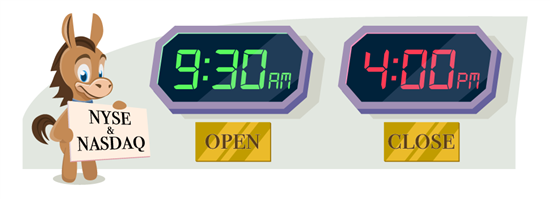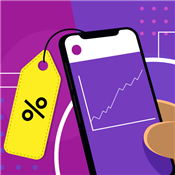What Time Does the Stock Market Open?
NYSE and NASDAQ are open 9:30 AM to 4:00 PM EST on weekdays and close at 1 PM on holidays. But you can still trade during closed hours. Learn how.
 |
The New York Stock Exchange (NYSE) and NASDAQ officially start their trading hours at 9:30 AM Eastern Time (6:30 AM Pacific).
Both exchanges close at 4:00 PM Eastern Time (1:00 PM Pacific).
Stock Market Holidays in the US
The stock market is closed on any of the following holidays if they fall on a regular trading day:
- New Year's Day
- Martin Luther King's Day
- President's Day
- Good Friday
- Memorial Day
- Independence Day
- Labor Day
- Thanksgiving Day
- Christmas Day
Stock Market Early Closing Times and Dates
In addition to the holidays, the stock exchanges close at 1 PM Eastern time on three dates:
- July 3rd (if it falls on a normal trading day)
- Black Friday (the day following Thanksgiving)
- Christmas Eve (if it falls on a normal trading day)
Stock Market Opening Times Around the World
If you are an international trader, here's a list of opening and closing times for stock markets around the world.
- Tokyo Stock Exchange:
9:00 AM to 3:00 PM Japan Standard Time - Toronto Stock Exchange:
9:30 AM to 4:00 PM Eastern Standard Time - Bombay Stock Exchange:
9:15 AM to 3:30 PM India Standard Time - Taiwan Stock Exchange:
9:00 AM to 1:30 PM Central Standard Time - Singapore Stock Exchange:
9:00 AM to 5:00 PM Singapore Standard Time
Before- and After-Hours Trading
 |
| © CreditDonkey |
Prior to 1990, traders could only trade during normal trading hours. Today, you may find brokers willing to conduct trades outside of regular trading hours.
The official NYSE and NASDAQ pre-market trading hours are 4:00 AM - 9:30 AM Eastern Time.
Pre-market trading in the U.S. typically occurs between 8:00 a.m. and 9:30 a.m., though it can start as early as 4:00 am Eastern Time.
Post-market trading hours are 4:00 PM - 8:00 PM Eastern Time.
Is It Smart to Trade Before or After Hours?
Trading volume during non-traditional trading hours is usually lower than the volume during standard trading times. This may mean more volatile stock prices.
Some traders use this time to make spontaneous trades after an earnings announcement or other company announcements that may affect the company's stock price.
Traders and most investment apps, such as Robinhood, may also allow investors to place orders on the weekend. You can place an order to "buy or sell at the best possible price." Learn more about how to do it in our Robinhood trading review.
But you are at the mercy of the market at that point. If it opens with a skyrocketing or falling stock price, you may be in for an unpleasant surprise when the trade is completed.
When Is the Best Time of Day to Trade?
Markets are volatile, so there's no scientific way to tell you exactly when to trade. Based on historical patterns, though, there are certain times of day that investors may want to focus on:
The first five minutes
This is when the market adjusts to any news that comes after hours. Seasoned traders sometimes take advantage of those first five minutes to make fast trades. New traders, however, are encouraged to wait out that volatile period.
First hour
Day traders sometimes have a better chance at high (and quick) profits trading during this time. Of course, it depends on the state of the market from day to day (or even minute to minute).
Afternoon
During the afternoon, volume trading tends to decrease, as does the stock's volatility. It is sometimes considered a "safer time" for new traders to get their feet wet.
End of the day
Just like the start of the day, the end of the day tends to be fraught with activity. Of course, it also depends on the news and the volatility of the market on a particular day.
Bottom Line
You can make trades before, during, or after the market's trading hours. Familiarizing yourself with the hours and getting acquainted with how the market works will help you make the most of your trades in the stock market.
Write to Kim P at feedback@creditdonkey.com. Follow us on Twitter and Facebook for our latest posts.
Note: This website is made possible through financial relationships with some of the products and services mentioned on this site. We may receive compensation if you shop through links in our content. You do not have to use our links, but you help support CreditDonkey if you do.
|
|
|









